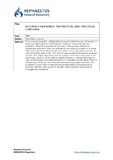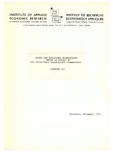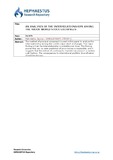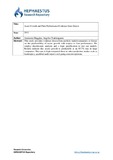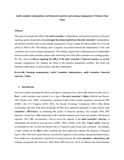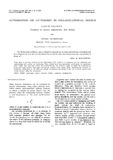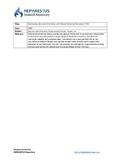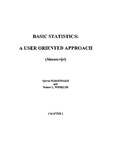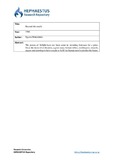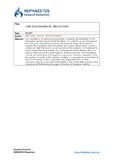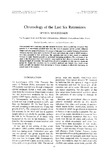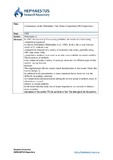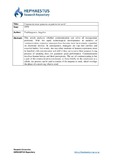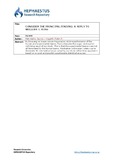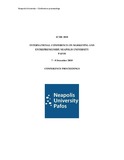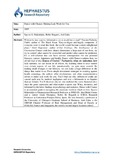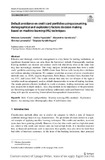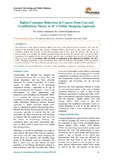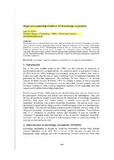Browsing School of Economic Sciences and Business by Subject "Research Subject Categories::SOCIAL SCIENCES::Business and economics"
Now showing items 1-20 of 141
-
Accuracy measures: theoretical and practical concerns
(Elsevier, 1993)The Notes section of the international Journal of Forecasting contains commentary on the theory and practice of forecasting in the form of communications to the journal such as research notes, teaching tips, practitioners’ ...
-
Analyse comparative du secteur manufacturlier Quebec-Ontario-Canada
(1978-12)La partie II de ce rapport étudie le secteur manufacturier du Québec et le compare avec celui de l'Ontario et de l'ensemhle du Canada. Les raisons d'une comparaison entre le secteur manufacturier du Québec et celui de ...
-
An Analysis of the Interrelationships Among the Major World Stock Exchanges
(Wiley, 1974-06)The method of principal component is used in this paper to analyse the interrelationship among the world's major stock exchanges. The major finding is that the interrelationship is unstable over time. This finding proves ...
-
Asset Growth and Firm Performance Evidence from Greece
(2012)This study provides evidence drawn from publicly traded companies in Greece on the predictability of assets growth with respect to firm performance. We employ discriminant analysis and a logit specification to test our ...
-
Audit committee independence and financial expertise and earnings management: Evidence from China
(Inderscience Enterprises Ltd., 2020-12)This paper investigates the effect of the audit committee's independence and financial expertise on financial reporting quality. In particular, we investigate the relationship between the audit committee's independence and ...
-
Automation or autonomy in organizational design.
(Gordon and Breach Science Publishers, 1979-04-23)Today there is growing criticism of the Input/Output (I/O) model as a conceptual tool for explaining and understanding how systems are functioning. These models have been particularly useful-mainly in engineering, where ...
-
Backtesting Derivative Portfolios with Filtered Historical Simulation (FHS)
(European Financial Management, 2002)Filtered historical simulation provides the general framework to our backtests of portfolios of derivative securities held by a large sample of financial institutions. We allow for stochastic volatility and exchange rates. ...
-
Basic statistics : a user oriented approach (manuscript)
(1981)Table 2.1 shows the ages of the 230 students who entered INSEAD during the 1980/81 academic year. What can you make out of these numbers? Obνiously, the answer will depend upon who you are. Unless you haνe some objectiνe ...
-
Beyond the oracle
(PA International Consulting Services Ltd., 1986)The priests of Delfphi have not been alone in providing forecasts for a price. Since the dawn of civilization, a great many fortune tellers, soothsayers, wizards, augurs and astrologers have sought to fulfil the human need ...
-
Can recessions be predicted?
(Elsevier Ltd, 1977-04)Can recessions, or serious turning points in general, be predicted? Or do forecasters tend to assume that the future will continue as an extension of the near past. Theoretical evidence and practical observations tend to ...
-
Chronology of the Last Six Recessions
(Pergamon press ltd, 1982)How successful have economists and other business forecasters been in predicting recessions? This question is of considerable practical value since the level of economic activity greatly influences budgets and other plans ...
-
Commentary on the Makridakis Time Series Competition (M-Competition)
(1983)In 1982, the Journal of Forecasting published the results of a forecasting competition organized by Spyros Makridakis (Makridakis et al., 1982). In this, the ex ante forecast errors of 21 methods were compared for forecasts ...
-
Communication, a managerial myth
(1978-08)Comunication is onc of the most widely used and least understood concepts current among managerof modern corporations.
-
Communication: panacea or pain in the neck?
(1978)This article analyzes whether communication can solve all management problems. With the rapid technological developments in methods of communication, corporate managers have become more increasingly dependent on electronic ...
-
Consider the principal finding: A reply to William T. Ross
(INFORMS, Institute for Operations Research and the Management Sciences, 1988-05)By focusang on issues concerning precise reUuive perfonnance of the human and experimental teams, Ross crtsscutes the nugor, and a priori »ir[»ising result of our study. This is that the experimental teams were not all ...
-
Consumers’ perceptions toward E-Service Quality, Perceived Value, Purchase and Loyalty Intentions
(Neapolis University Paphos, 2018)Purpose: Customers’ Perceptions and Attitudes are significant aspects of consumer behavior for Marketing. Such perceptions and attitudes are measured as advantages, carrying special weight for the company. Furthermore they ...
-
Dance with Chance: Making Luck Work for You
(Oneworld Publications, 2009)Written by true experts. Informative yet so much fun to read!" Nassim Nicholas Taleb- author of The Black Swan "Easy-to-digest and highly competent. If everyone were to read this book, the world would become a more enlightened ...
-
Default avoidance on credit card portfolios using accounting, demographical and exploratory factors: decision making based on machine learning (ML) techniques
(Springer Verlag, 2020-11)Effective and thorough credit-risk management is a key factor for lending institutions, as significant financial losses can arise from the borrowers’ default. Consequently, machine learning methods can measure and analyze ...
-
Digital Consumer Behaviour in Cyprus: from Uses and Gratifications Theory to 4C’s Online Shopping Approach
(Sryahwa Publications, 2018)The behaviour of the digital consumer differs from that of the digital-internet consumer. Not with the regard to the procedure that the average consumer follows, but mostly to the «why» and «how» a consumer prefers and ...
-
Dispersed Leadership Predictor Of Knowledge Acquisition
(IEDC, International Economic Development Council, 2002)Behavioural and interpersonal skills most often cited as essential for successful knowledge acquisition. Little is known, however, about the roles played by 'dispersed leadership' in the process of knowledge acquisition. ...

